Brother Group Materiality
In the Brother Group Vision "At your side 2030," we declare our purpose as "By being 'At your side,' we enable people's productivity and creativity, contribute to society, and help protect the earth." To contribute to society and help protect the earth, we identified five materialities as priority social issues in 2022. Subsequently, having reviewed our materialities in light of changes in the environment, we redefined them into six materialities in 2025. The Brother Group will continue to address these materialities in order to further advance its management with an emphasis on sustainability.
Materiality
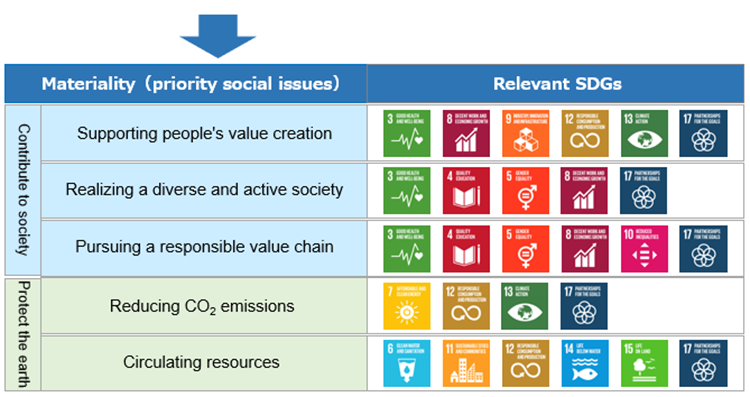
Supporting people's value creation
This materiality is linked to "Our Purpose" stated in the Brother Group Vision "At your side 2030." It expresses Brother's desire to contribute to the enriched and comfortable lifestyles of people around the world through our activities and value provided by Brother's diverse products and services.
Empowering diverse people
This materiality aims to create an environment where diverse employees can play an active role in the Brother Group, and where diverse perspectives, knowledge, and values that are not based on any particular attribute are leveraged in creating innovation and decision-making of the organization.
Pursuing a responsible value chain
We are committed to conducting assessments using appropriate methods and making continuous improvements to ensure that the human rights of all people involved in the value chain of Brother's business operations are respected and that the safety and security of all workers are protected.
Reducing CO2 emissions
Aim to achieve carbon neutrality in business activities and minimize CO2 emissions across the entire value chain, contributing to the formation of a decarbonized society.
Promoting sustainable use of resources
Maximize resource circulation, promote the sustainable use of resources, and minimize the environmental impact of waste.
Supporting value creation through governance
This is a new materiality that was added in FY2025 in order to implement governance reforms to support the transformation of our business portfolio. For the sustainable growth and value creation of the Brother Group, we will continuously review and implement governance that ensures transparency and fairness in management and encourages appropriate risk-taking toward transformation.
Materiality and Sustainability Targets
| Materiality | CS B2027 policies and Sustainability targets |
|---|---|
| Supporting people's value creation |
|
| Empowering diverse people |
|
| Pursuing a responsible value chain |
|
| Reducing CO2 emissions |
|
| Promoting sustainable use of resources |
|
| Supporting value creation through governance |
|
- Scope 1, 2, 3
Categories of greenhouse gas emission sources; Scope 1 refers to direct greenhouse gas emissions by business operators, Scope 2 refers to indirect greenhouse gas emissions resulting from use of electricity, heat, and steam supplied by other entities, and Scope 3 refers to indirect greenhouse gas emissions other than Scope 1 and 2 (emissions by other entities related to the activities of business operators) - CO2 emissions per unit of sales revenue
- Virgin material usage per unit of sales revenue
Materiality and Future-financial targets
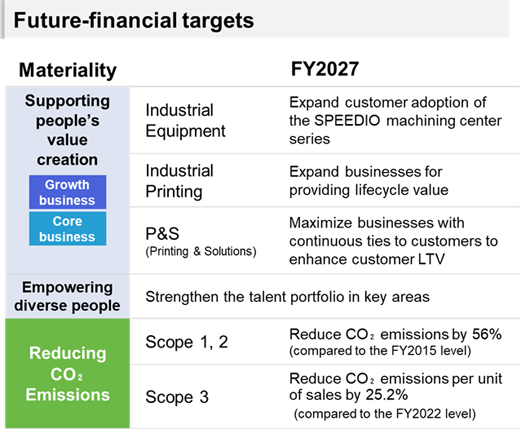
In line with the formulation of the medium-term business strategy "CS B2027", the Brother Group has set the main items related to three of the six materialities that need to be addressed: supporting people's value creation, empowering diverse people, and reducing CO2 emissions. The set items are regarded as future-financial targets. To emphasize that initiatives aimed at achieving these targets are expected to lead to future financial outcomes, we refer to them not as "non-financial" but as "future-financial" targets.
For the materiality "supporting people's value creation," we will promote sales expansion of machine tools in the Industrial Equipment business of the Machinery Business Division, expansion of lifecycle value-providing services in the industrial printing field of the Industrial Printing Business Division, and business expansion aimed at improving the lifetime value of customers in the P&S Business.
In terms of the materiality "empowering diverse people," we will strengthen our talent portfolio in key areas.
Meanwhile, for the materiality "reducing CO2 emissions," we have set new targets for Scope 1, 2, and 3 and are working toward these targets. We will be proactively committed to initiatives friendly to the global environment, such as improving the energy efficiency of our products, reusing our products, using recycled materials, extending the lifespan of our products, and promoting subscription-based businesses, to create an environment in which customers can use our products for longer periods of time.
Materiality Identification Process
To achieve our purpose set out in the Brother Group Vision "At your side 2030" as "contribute to society and help protect the earth," the Brother Group identified five materialities when formulating its medium-term business strategy "CS B2024" in 2022: supporting people's value creation, realizing a diverse and active society, pursuing a responsible value chain, reducing CO2 emissions, and circulating resources.
Subsequently, in response to changes in the environment from 2022 onwards and increasing societal demands, including the directive on disclosure of sustainability information, we reviewed our materialities in line with the formulation of our medium-term business strategy "CS B2027" (2025) and redefined them into six materialities.
In reviewing our materialities, we comprehensively identified the value chains and key stakeholders for each business to uncover relevant challenges. Based on this, we identified important sustainability challenges (materialities) from the perspective of double materiality,* verified their appropriateness while listening to the opinions of stakeholders, and finalized them.
This review newly adds materiality related to governance. While we have been working to strengthen our governance, through dialogue with stakeholders we have come to recognize the importance of continually reviewing and implementing governance that supports appropriate risk-taking to accelerate the transformation of our business portfolio as outlined in CS B2027. For this reason, after discussion at the Sustainability Committee, we have also identified "supporting value creation through governance" as a materiality and clarified its importance.
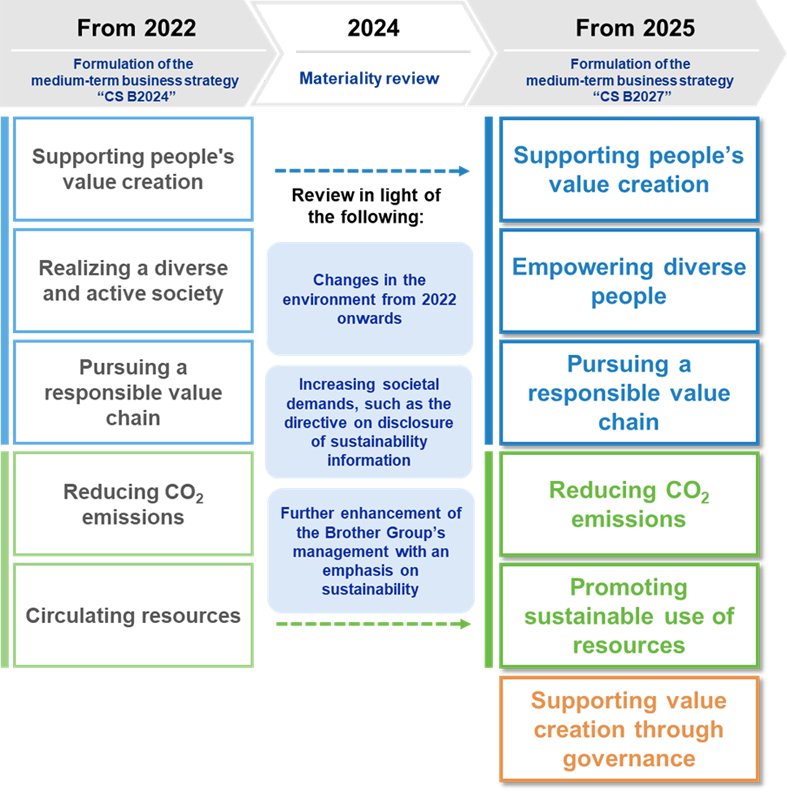
- The concept of identifying key issues from two perspectives: the impact that corporate activities have on society and the environment (impact materiality), and the impact that society and the environment have on corporate development, business performance, and financial status (financial materiality)
Materiality identification process in formulating the medium-term business strategy "CS B2024"
| Step | Specific initiatives |
|---|---|
1.Identify issues |
|
2.Evaluate importance |
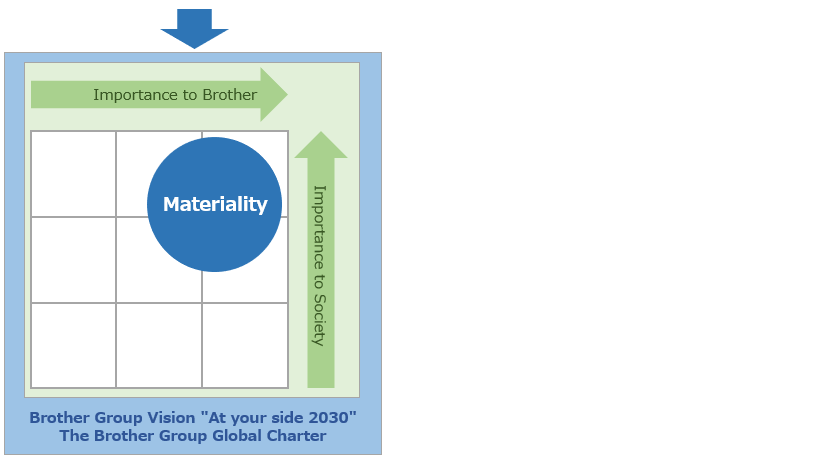
|
3.Draft materialities |
|
4.Gather external opinions |
|
5.Make adjustments to materiality draft |
|
6.Identify materialities |
|
7.Set targets |
|
Materiality review process in formulating the medium-term business strategy "CS B2027"
| Step | Specific initiatives |
|---|---|
1.Organize value chains and stakeholders |
|
2.Identify IROs* |
|
3.Assess IROs |
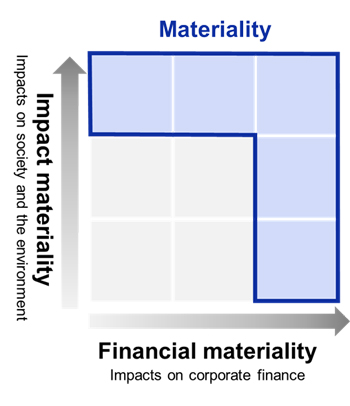
|
4.Identify materialities |
|
5.Stakeholder engagement |
|
6.Finalize materialities |
|
- Impacts, risks, and opportunities
Sustainability Targets and Achievements for the Duration of CS B2024
The Brother Group has set sustainability targets for the term of "CS B2024", the medium-term business strategy, to address the materialities identified for achieving the Brother Group Vision, "At your side 2030," and has taken action as important management issues. The results of measures implemented in FY2024 are described below.
| Materiality | Targets for FY2024 | FY2024 Results | |
|---|---|---|---|
| Contribute to society | Supporting people's value creation |
|
|
|
|
||
| Realizing a diverse and active society |
|
|
|
|
|
||
|
|
||
| Pursuing a responsible value chain |
|
|
|
|
|
||
| Protect the earth | Reducing CO2 emissions |
|
|
| Circulating resources |
|
|
|
- Lifetime Value (LTV)
Customer lifetime value, which is the value to customers and profits generated for companies over the entire usage period of products and services - Brother Industries, Ltd.
- Responsible Business Alliance (RBA)
International organization to promote CSR, which establishes standards to ensure that working conditions are safe, that workers are treated with respect and dignity, and that business operations are conducted environmentally responsibly and ethically in the supply chains of the manufacturing industry - Brother Technology (Shenzhen) Ltd.
- Brother Industries (Philippines), Inc.
- Brother Industries (Vietnam) Ltd.
- Categories of greenhouse gas emission sources: Scope 1 refers to direct greenhouse gas emissions by business operators, Scope 2 refers to indirect greenhouse gas emissions resulting from use of electricity, heat, and steam supplied by other entities, and Scope 3 refers to indirect greenhouse gas emissions other than Scopes 1 and 2 (emissions by other entities related to the activities of business operators)

